Kevin Clarke
Operetta Research Center
26 Deccember, 2023
At the Theater Osnabrück a new production of Im weißen Rössl is currently playing, a staging by Tobias Bonn of Geschwister Pfister fame. Since it was the Geschwister Pfister who ushered this show into the modern era in 1994 with their Bar jeder Vernunft version, that is blessedly preserved on DVD, and since Tobias Bonn was arguably one of the best – if not the best – Leopold since Max Hansen, his reading of the piece in Osnabrück can be seen as especially interesting.
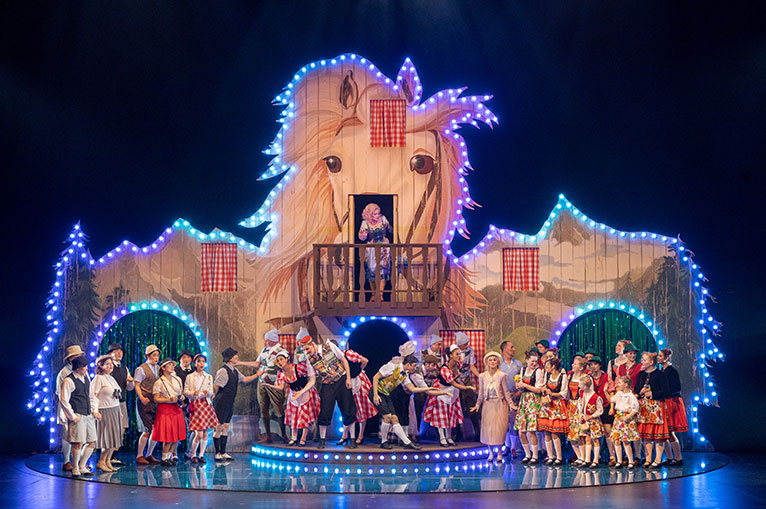
The set for “Im weißen Rössl” in Osnabrück. (Photo: Stephan Glagla / Theater Osnabrück)
Just like the 1994 staging, the new one in Osnabrück is very basic: it offers a one-set-fits-all approach, with a giant wooden “horse” (designed by Okarina Peter and Timo Dentler) which serves a hotel, mountain panorama, restaurant and everything else. It’s also as over-the-top kitsch as can be. Which is great, if you want to emphasize the omnipresent kitsch elements of this Alpine romp.
On this bare stage, there is a central door leading into the hotel, and there are entrances left and right with glittering curtains through which furniture, tourists and sets are moved in and out on a turntable. Everything looks picturesque, including the costumes in red-and-white table cloth patterns.
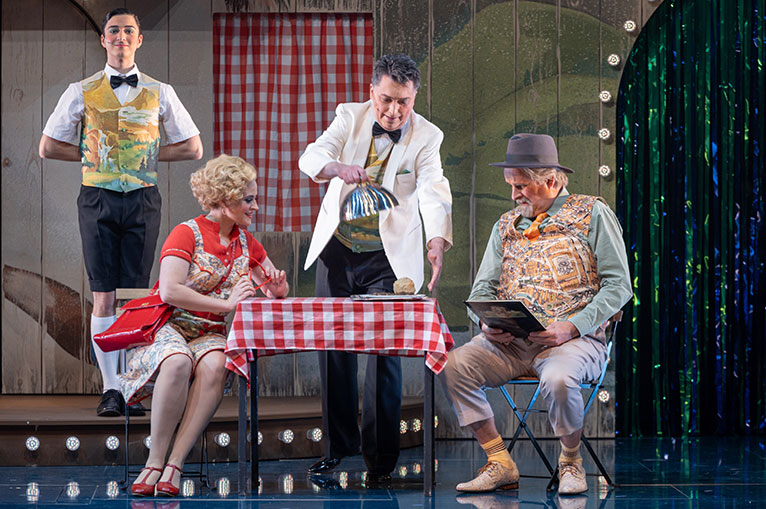
The Giesecke family being served by Leopold and Piccolo in “Im weißen Rössl” in Osnabrück. (Photo: Stephan Glagla / Theater Osnabrück)
It’s a setting that leaves maximum room for the actors to shine and fill the stage with personality. It’s a stage setting in which Tobias Bonn himself would have made a superior splash as Leopold, not to mention the rest of the 1994 cast. But the Theater Osnabrück has opted for a very different type of casting. And that’s where – for me – a lot of problems arise.
Conductor Daniel Inbal uses the 1950s version of the score, not the 1930 original. That’s fine, because the later version is musically opulent and dramaturgically better constructed. (It’s Erik Charell’s own “final” and approved version.) Inbal also uses opera singers in all the central roles. (I’ll get to the exceptions in a second.) As a result, Josepha Vogelhuber is SUNG (with capital letters) by Susann Vent-Wunderlich as if she were auditioning for the Marschallin, making her “Es ist einmal im Leben so” a particularly poised monologue that sounds as if she’s about to morph into “Hab’ mir’s gelobt” any second.
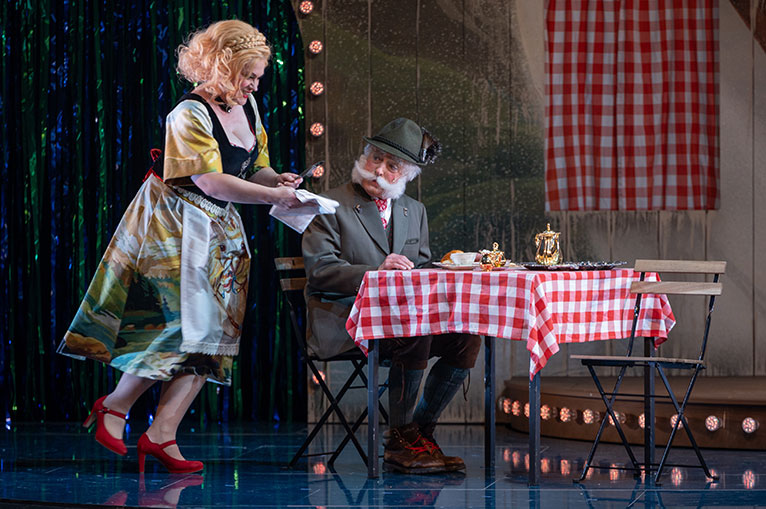
Susann Vent-Wunderlich and Helmut Thiele in “Im weißen Rössl”. (Photo: Stephan Glagla / Theater Osnabrück)
Obviously, that’s one way of interpreting this role. I found it utterly wrong, because Josepha is – for me – mostly a non-singing character who has to be bouncy and down-to-earth in “Im Salzkammergut da kann man gut lustig sein”, and above all else a brilliantly shrewd actress in her scenes with Leopold – and that monologue. Vent-Wunderlich doesn’t aim for that kind of Josepha.
At her side there’s Jan Friedrich Eggers as Leopold, someone who sings Don Giovanni, Ford (in Falstaff), Rossini’s Figaro and such like roles. He’s as far removed from the Max Hansen type of Rössl singing as you can get. Which means his “Es muss was Wunderbares sein” or “Zuschau’n kann ich nicht“ get a grand big-sing treatment, not a celebration of double entendre in which the actor winks at the audience throughout, getting all the jokes in Robert Gilbert’s lyrics across.
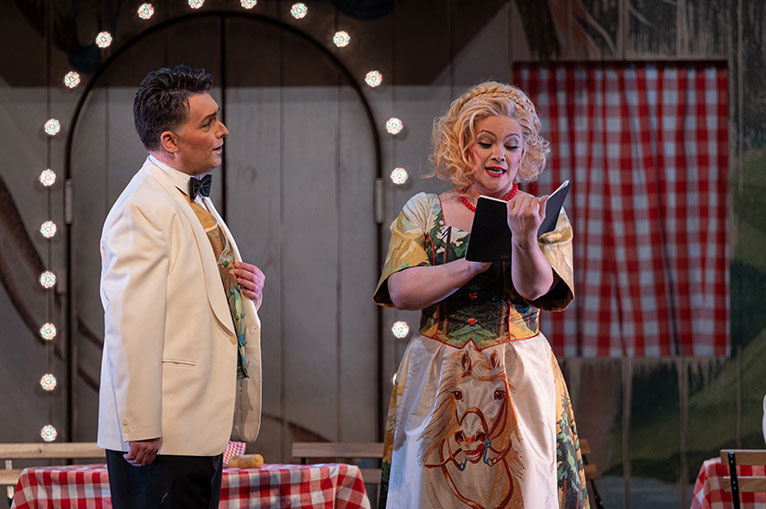
Jan Friedrich Eggers and Susann Vent-Wunderlich in “Im weißen Rössl”. (Photo: Stephan Glagla / Theater Osnabrück)
The same can be said about Susanna Edelmann as Ottilie, who is a Josepha look-alike here, and also about most of the others in the main cast (Manuel Karadeniz as Dr. Siedler, and Dirk Audehm as Giesecke).
On the plus side of this production, the theater is cooperating with the local music school and has engaged many students who are training to be “musical” actors. Seeing them amid this opera ensemble is a blessing, because they remind the audience what a show like Rössl needs most: agility, presence, humor, personality, and comic timing. Pascal Dominik Schmid as second waiter Piccolo demonstrates all that from the moment he walks on stage in the first scene of the operetta. He’s such a bubbly presence that I regretted throughout the evening that this Piccolo doesn’t get a chance to fully bounce off Leopold, because Eggers is too busy singing instead of reacting to such a glorious performer. For me, Schmid was the star attraction in this hotel.
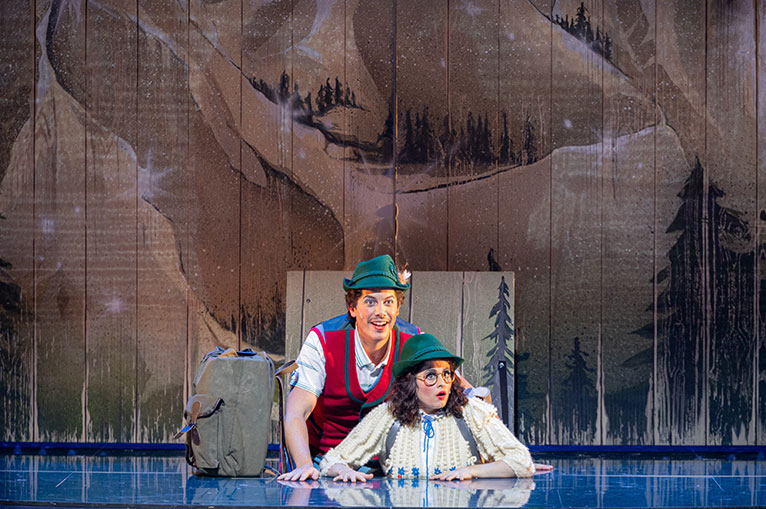
Annemarie Purkert and Daniel Preis in “Im weißen Rössl”. (Photo: Stephan Glagla / Theater Osnabrück)
The other outstanding performer, also from team “musical”, was Annemarie Purkert as Klärchen. She really rocked. And was ideal casting, in every way. Sadly, Daniel Preis as Sigismund looked very unfunny in his costume and wasn’t the right partner for such a knock-out personality as Purkert.
The small dance ensemble was also composed of students, and they showed that they can easily move and do anything, even if the stage director and choreographer (Dominik Büttner) don’t really use them as more than fill-in moments. Especially in a revue operetta – with so much space on stage – a stronger emphasis on dance elements would have been welcome.
Another bright side of the evening was Helmut Thiele as the Emperor, because he was genuinely funny and had the exact right stage presence to carry off this important mini role. Bravo!
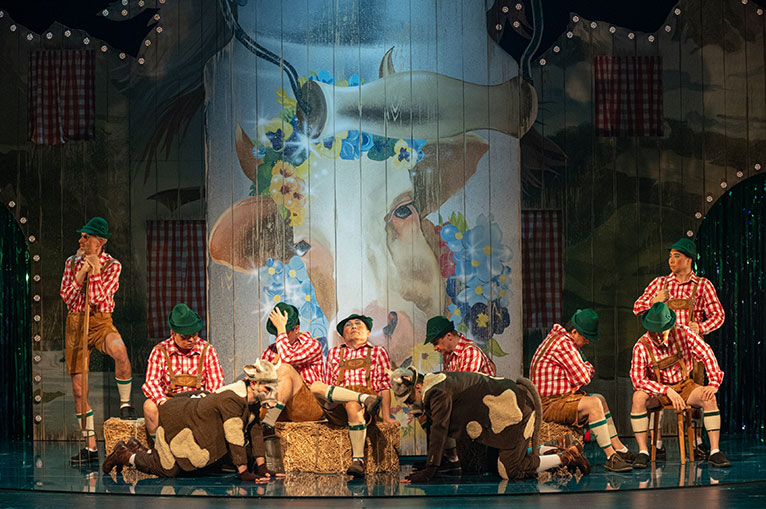
The cowboys in “Im weißen Rössl”. (Photo: Stephan Glagla / Theater Osnabrück)
I sat through the performance and felt sorry that the younger characters in the show were not all cast with musical people instead of an opera crowd, as if this were a standard operetta production from the 1970s or 80s. That said, upon leaving the theater I overheard various people around me saying how wonderful they found the performance, how “daring” they thought the kitsch elements were … for Osnabrück. Obviously, there is an audience for this type of operetta reading, so who am I to quibble?
Bottom line is, the text book by Hans Müller is so fabulous that even performers who are not the most fabulous actors get laughs at every single joke. No matter how often you’ve heard them. The piece is simply indestructible, and that applies to the music too. Realizing that was amazing.
For the future, I hope Purkert and Schmid will get more operetta opportunities in Osnabrück or elsewhere, they are born to perform in the genre. (As are their colleagues Amani El Sadek, Salyma Chatty, Natalie Patricia Friedrich, Daniel Nothnagel et al.)
There are double performances on New Year’s Eve, and then regular performances until March 2024. For more details, click here.
